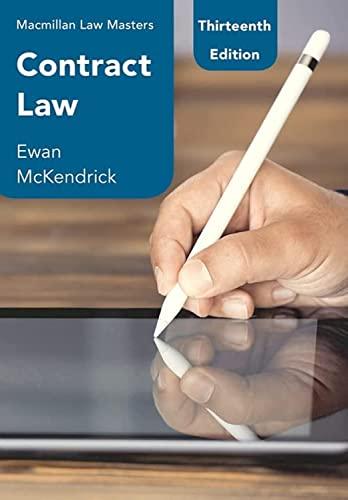


hello tutors....
- The doctrine of judicial review Answer a. results from the fact that state and federal constitutions provide for three co-equal branches of government. b. is the source of the system of checks and balances. c. is the power of the judiciary to review the actions of the other branches of government and to declare such actions void if they violate the Constitution. d. is the power of the judiciary to interpret the intent of the legislature in applying a statute to a factual situation. e. is no longer valid.
- What source of law provides that statutes and treaties made under the authority of the United States shall be the supreme law of the land? Answer a. The common law b. The United States Constitution c. The United States Code of Federal Procedure d. The Uniform Commercial Code e. Murphy's Law
- In a crowded and complex society, rights will clash. When that occurs in the legal environment of business, what might be expected to follow? Answer a. Revolution. b. A court, if called upon to settle the dispute, will weigh and balance various factors, including the importance to society of the rights in dispute. c. If a party has a right, it is absolute. d. Rights disputes will not occur in business because businesses have no rights. e. All of the above.
QUESTION 5 Which of the following best describes the relationship between law and ethics? a. Law and ethics are identical. b. Law imposes standards more strict than those contained in codes of ethics. c. Ethical values influence the development of the law, but the law does not influence ethical values. d. Ethical standards go beyond the law and are often not satisifed by mere conformance to the applicable laws. Oe. Law and ethics cannot be defined legally. QUESTION 6 Reginald owns a grocery and his clerks are on strike. Reginald is trying to operate the store with the help of his manager, but ten of the striking clerks are crowding near the store entrance with large picket signs. If Reginald asks you what can be done, your best answer would be for Reginald to a. seek a rescission that will return the clerks to their status quo. b. merge law and equity. c. seek a decree of specific performance. d. seek an injunction. e. hire Norris, Stallone and Segal.QUESTION 7 As incorporated into our Constitution, the principle of means there are three distinct and independent branches of government. a. separation of powers b. stare decisi c. civil law d. common law e. administration law QUESTION 8 Suppose a dispute arises between a company that pollutes the air and a nearby farmer who is adversely affected by the pollution. If no federal or state statute controls this kind of pollution, the dispute involves a. private and civil law. Ob. public law and criminal law. O c. procedural law and criminal law. Od. common law, precedent, and public law. Oe. public law only. QUESTION 9 Which of the folowing accurately describes the concept of procedural laws? a. Statutes that have been passed by legislative bodies Ob. Common law derived from cases decided by the courts c. The federal Constitution and state constitutions d. Statutes that determine how lawsuits are handled in the courts covering such matters as rules of evidence and related issues (method to enforce rights and duties) Oe. Rules used by Chancellor in Courts of Equity Click- OnQUESTION 1 The doctrine of judicial review a. results from the fact that state and federal constitutions provide for three co-equal branches of government. b. is the source of the system of checks and balances. c. is the power of the judiciary to review the actions of the other branches of government and to declare such actions void if they violate the Constitution. d. is the power of the judiciary to interpret the intent of the legislature in applying a statute to a factual situation. e. is no longer valid. QUESTION 2 What source of law provides that statutes and treaties made under the authority of the United States shall be the supreme law of the land? Oa. The common law Ob. The United States Constitution c. The United States Code of Federal Procedure d. The Uniform Commercial Code Oe. Murphy's Law QUESTION 3 The notion of civil disobedience is founded on what principle? . a. That immoral or illegitimate laws should not be obeyed b. That political demonstrations can be used to obtain preferential treatment under the law O c. That the political process can be controlled by small but vocal minorities d. That individuals should disobey the law when such disobedience will improve their own position in life e. Stare decisiQUESTION 4 Prior judicial decisions are binding authority in subsequent cases under the principle of a. ethical custom. b. social control by influencing behavior. Oc. stare decisi d. judicial review. Oe. Curia Regis. QUESTION 5 Which of the following best describes the relationship between law and ethics? a. Law and ethics are identical. Ob. Law imposes standards more strict than those contained in codes of ethics. c. Ethical values influence the development of the law, but the law does not influence ethical values. d. Ethical standards go beyond the law and are often not satisifed by mere conformance to the applicable laws. Oe. Law and ethics cannot be defined legally. QUESTION 6 Reginald owns a grocery and his clerks are on strike. Reginald is trying to operate the store with the help of his manager, but ten of the striking clerks are crowding near the store entrance with large picket signs. If Reginald asks you what can be done, your best answer would be for Reginald to Oa. seek a rescission that will return the clerks to their status quo. O b. merge law and equity. c. seek a decree of specific performance. Od. seek an injunction. e. hire Norris, Stallone and Segal













